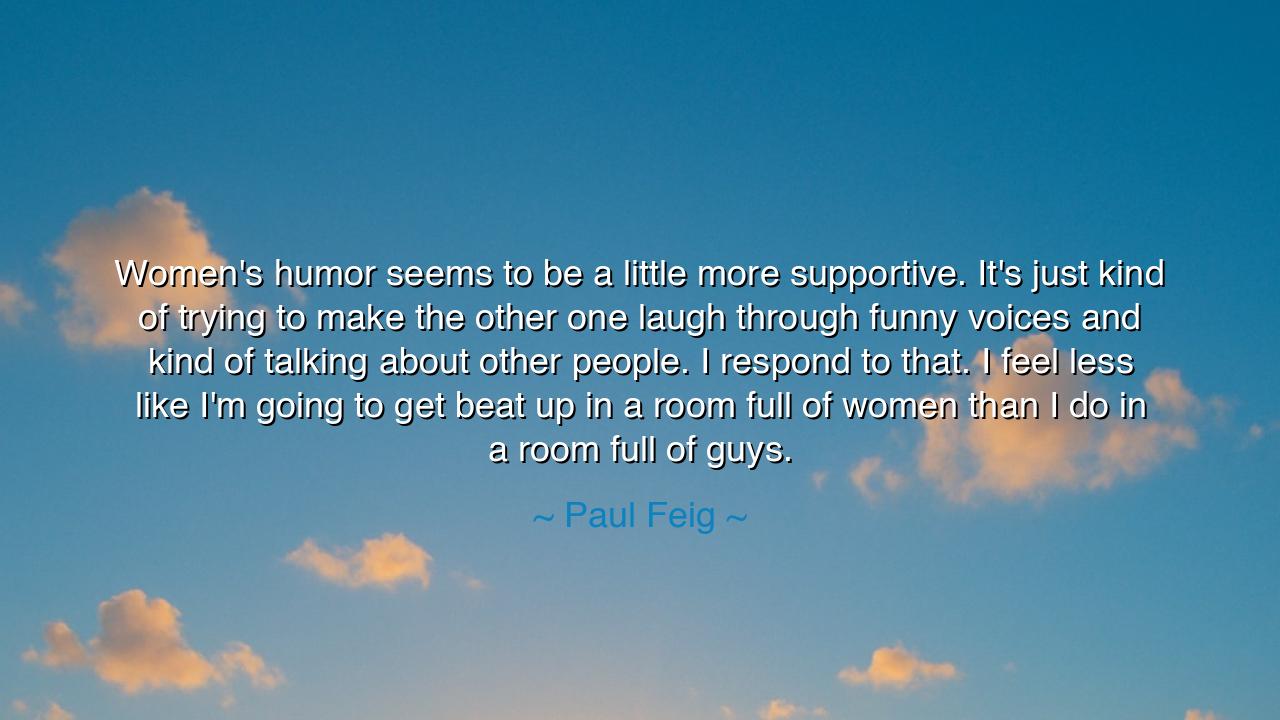
Women's humor seems to be a little more supportive. It's just
Women's humor seems to be a little more supportive. It's just kind of trying to make the other one laugh through funny voices and kind of talking about other people. I respond to that. I feel less like I'm going to get beat up in a room full of women than I do in a room full of guys.






The words of Paul Feig — “Women’s humor seems to be a little more supportive. It’s just kind of trying to make the other one laugh through funny voices and kind of talking about other people. I respond to that. I feel less like I’m going to get beat up in a room full of women than I do in a room full of guys.” — carry within them not only a reflection on humor, but on the very nature of human connection. Beneath this gentle and humorous observation lies an ancient truth: that laughter, though universal, takes many forms — some born from competition, others from compassion. Feig, a creator of comedies rich in empathy and heart, honors in these words the spirit of laughter that unites rather than divides, that heals rather than wounds.
To understand his insight, we must first consider what he means by supportive humor. In his experience, the humor of women — as he describes it — is communal. It is a bridge, not a blade. It is laughter that invites rather than excludes, born from a desire to connect, to comfort, to share in the absurdity of being human. This kind of humor, gentle yet powerful, is as old as storytelling itself. In ancient gatherings, women’s songs and tales often served not to boast or dominate, but to strengthen the bonds of family and friendship. Their laughter was the hearth fire — steady, warm, and sustaining — around which others found solace.
In contrast, Feig contrasts this with what he calls the humor of men, often shaped by rivalry, teasing, and the instinct to test strength. In many societies, men learned to joke as warriors — their laughter a sparring ground where wit replaced the sword. Such humor is not evil; it is simply born of another purpose. Where one form of laughter seeks unity, the other seeks hierarchy. The ancient Greeks, too, knew this difference: Aristophanes’ comedies — full of mockery and satire — were celebrated in public arenas, while the soft, playful humor of hearth and home was shared in the private space, where intimacy replaced the need for conquest.
Feig’s reflection is both cultural and personal. As a filmmaker, he has long gravitated toward stories that celebrate the power of women’s voices — comedies like Bridesmaids and Ghostbusters, where humor becomes a force of inclusion, not aggression. He recognizes in women’s laughter a rare courage: the ability to be vulnerable, to laugh at oneself without cruelty. In such humor, there is safety — a shared recognition of life’s awkwardness, its chaos, its endless imperfection. To “feel less like I’m going to get beat up” is to describe a space of emotional peace, a place where laughter disarms rather than defends.
History offers us many examples of supportive humor — that sacred laughter which lifts rather than lowers. In the courts of Queen Elizabeth I, the women of her chamber used jest and wit not to insult, but to soften the tension of politics and war. Even in tragedy, such as during times of plague or famine, women were often the keepers of laughter, using it to soothe the fearful and strengthen the weary. Their humor was resilience made audible. It whispered that even in darkness, there is still light; even in sorrow, there is still the music of shared humanity.
The origin of Feig’s wisdom, then, comes not from study alone but from experience — from witnessing how different kinds of laughter create different kinds of spaces. A supportive humor builds community; a competitive humor builds character. Both have their place, yet Feig reminds us that in a world already bruised by conflict and ego, the gentler laughter — the one that heals — is needed most. It is the laughter that listens, the humor that embraces, the joy that says: “You belong.”
The lesson we must draw from his words is simple yet profound: be mindful of the laughter you create. Ask yourself — does my humor build or break? Does it invite others to join, or push them away? Choose the humor of kindness, for it is the laughter that endures. In conversation, in friendship, in art — seek to make others feel seen, not small. Remember that the greatest comedians are not those who mock, but those who reveal the shared humanity that binds us all.
And so, dear listener, take Paul Feig’s insight as both truth and challenge. Let your humor be supportive, not scornful; warm, not cruel. When you make others laugh, let it be from a place of love, not dominance. For laughter, when pure, is one of the oldest forms of grace — a reminder that even in difference, we are one. The world has enough sharp tongues and hard voices; what it needs are more souls who can turn pain into play, and loneliness into laughter. Be one of them — the kind of person in whose presence others feel lighter, safer, and more alive.






AAdministratorAdministrator
Welcome, honored guests. Please leave a comment, we will respond soon